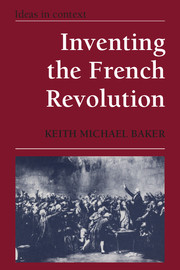Book contents
- Frontmatter
- Contents
- Acknowledgments
- Introduction
- 1 On the problem of the ideological origins of the French Revolution
- Part I French history at issue
- 2 Memory and practice: politics and the representation of the past in eighteenth-century France
- 3 Controlling French history: the ideological arsenal of Jacob-Nicolas Moreau
- 4 A script for a French revolution: the political consciousness of the abbé Mably
- Part II The language of politics at the end of the Old Regime
- Part III Toward a revolutionary lexicon
- Notes
- Index
4 - A script for a French revolution: the political consciousness of the abbé Mably
Published online by Cambridge University Press: 05 June 2012
- Frontmatter
- Contents
- Acknowledgments
- Introduction
- 1 On the problem of the ideological origins of the French Revolution
- Part I French history at issue
- 2 Memory and practice: politics and the representation of the past in eighteenth-century France
- 3 Controlling French history: the ideological arsenal of Jacob-Nicolas Moreau
- 4 A script for a French revolution: the political consciousness of the abbé Mably
- Part II The language of politics at the end of the Old Regime
- Part III Toward a revolutionary lexicon
- Notes
- Index
Summary
My aim in this essay is to draw attention to the political dimensions of Mably's thinking. I do not wish to review his doctrines concerning the nature of man, government, and society, that broad range of issues traditionally subsumed under the capacious category of “political thought.” I mean rather to argue that he thought about such matters “politically” in a more direct and strictly defined sense of the term, that he framed an analysis of French government and society in an explicitly political mode for a consciously political purpose.
What do I mean by a specifically political mode of thinking? I mean a representation of the social field that emphasizes will, contingency, choice, participation. In this mode of thinking, social existence – be it orderly or chaotic, just or unjust – is seen as the expression of will, whether exercised unilaterally by a sovereign power (de jure or de facto) or multilaterally by the conflict or concurrence of any number of competing bodies. As a result, social life is thought of as contingent, in that its state at any particular point in time depends upon the exercise of some will (or wills) and can be changed by it. Analytical emphasis is therefore placed upon such categories of action as choice, defined as the exercise of individual or collective will, and participation, defined in terms of the relationship of individual will to public will.
- Type
- Chapter
- Information
- Inventing the French RevolutionEssays on French Political Culture in the Eighteenth Century, pp. 86 - 106Publisher: Cambridge University PressPrint publication year: 1990
- 3
- Cited by

